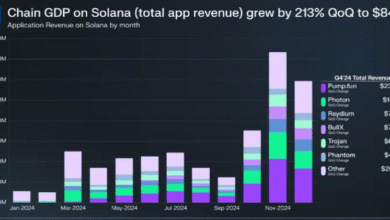Bitcoin ETFs See $602 Million Surge in Inflows

Bitcoin ETFs have emerged as a formidable force in the cryptocurrency investment landscape, with a remarkable $602 million surge in recent inflows that underlines their growing popularity. This significant influx is primarily driven by strong performances from renowned funds like the Fidelity Bitcoin ETF and Blackrock Bitcoin ETF, both of which have captured the attention of institutional investors looking to diversify their portfolios. As the market for digital assets continues to expand, Bitcoin ETF inflows are a telling sign of renewed investor confidence in cryptocurrencies. Meanwhile, the renewed interest in Ethereum ETFs, which also saw robust inflows of $148.57 million, indicates a broader trend toward embracing cryptocurrency assets in traditional investment vehicles. With total trading volumes hitting $2.51 billion, Bitcoin ETFs are poised to play a critical role in shaping the future of cryptocurrency investments.
Exchange-traded funds linked to Bitcoin have gained remarkable traction, showcasing a dynamic shift in the landscape of digital asset investments. The recent surge in institutional demand has resulted in significant inflows, emphasizing the growing acceptance and adoption of these financial products. Notably, products such as the Fidelity Bitcoin ETF and the Blackrock Bitcoin ETF are at the forefront of this trend, attracting substantial capital from investors eager to tap into the potential of cryptocurrencies. Moreover, the enthusiasm surrounding Ether ETFs adds further momentum to the market, reflecting a comprehensive transformation in how investors approach cryptocurrency markets. As financial instruments specifically designed for digital currencies continue to evolve, they are not merely reshaping investment strategies but also redefining traditional investing paradigms.
Recent Surge in Bitcoin ETF Inflows
The recent $602 million surge in Bitcoin ETF inflows is a testament to growing institutional interest in cryptocurrency investments. This influx of capital, particularly into Fidelity’s FBTC and Blackrock’s IBIT, underscores a pivotal moment for digital assets as serious players like these firms attract significant investor confidence. In this climate, resources dedicated to Bitcoin ETFs are increasingly sought after, signaling a shift in how investors view the robustness of cryptocurrency markets.
As more investors flock to Bitcoin ETFs, the landscape is changing rapidly. The $601.94 million inflow recorded on July 3 demonstrates a clear trend where institutional appetite for digital assets continues to assert itself. This dynamic ultimately promotes broader participation in cryptocurrency markets, leading to enhanced trading volumes and overall market stability.
The Role of Fidelity and Blackrock in Bitcoin ETFs
Fidelity’s dominance in the Bitcoin ETF market is highlighted by a staggering $237.13 million inflow, showcasing the company’s pivotal role in popularizing cryptocurrency investments. By providing broad access and infrastructure, Fidelity has positioned itself as a go-to for traditional investors looking to explore Bitcoin through ETFs. Likewise, Blackrock’s performance, with $224.53 million in inflows, illustrates its formidable presence, making it a formidable player in the ETF arena.
Both Fidelity and Blackrock are not only driving significant inflows into Bitcoin ETFs but are also setting the standard for how these investment vehicles operate. Their strategies likely include a focus on transparency, lower fees, and educational resources, helping investors navigate the complexities of cryptocurrency in a regulated space. This proactive approach contributes to building trust and attracting further capital into Bitcoin ETF offerings.
Ethereum ETFs Join the Inflow Trend
Amidst the Bitcoin ETF frenzy, Ethereum ETFs have also shown resilience, capturing $148.57 million in inflows recently. This considerable influx signals a rejuvenated interest among investors in Ethereum as a viable alternative to Bitcoin investments. Blackrock’s ETHA leading the charge with $85.38 million exemplifies confidence in Ethereum’s underlying technology and market potential, further diversifying the crypto investment landscape.
The growth in Ethereum ETFs complements Bitcoin’s impressive momentum, indicating that investors are becoming increasingly aware of the broader crypto ecosystem. Fidelity’s FETH has also played a critical role, adding $64.65 million to its holdings. Such varied participation in different cryptocurrency ETFs suggests that investors are not only looking for Bitcoin exposure but are also keen to tap into the potential growth of Ethereum and other altcoins.
Institutional Appetite for Digital Assets
The fervent institutional appetite for digital assets is unmistakably reflected in the latest Bitcoin and Ethereum ETF inflows. The total value traded of $2.51 billion is indicative of an increasingly mature market where large players are taking significant bets on the future of cryptocurrencies. As institutions weigh the benefits of including these assets in diversified portfolios, Bitcoin ETFs continue to serve as primary vehicles for gaining exposure.
Moreover, the resilience in digital asset trading suggests that institutional investors are not deterred by market volatility. The strong trading volumes across Bitcoin and Ethereum ETFs point toward a sincere long-term belief in the value of these cryptographic technologies. This shift may well signal the beginning of a more widespread acceptance of cryptocurrencies within traditional finance.
The Competitive Landscape of Bitcoin ETFs
As Bitcoin ETFs gain traction, the competitive landscape is heating up with notable players including Ark 21Shares and Bitwise making their mark. Ark 21Shares’ ARKB secured $114.25 million in inflows, showcasing a diversified interest in investment options beyond just the two largest ETF providers. This growing competition could lower fees and improve transparency among ETF products, ultimately benefiting the consumer.
With multiple options in the marketplace, investors are now empowered to choose ETFs that align closely with their investment philosophies. The presence of smaller firms like Bitwise, which contributed $15.53 million to the mix, illustrates a democratization of access to cryptocurrency investments. As the competition evolves, these dynamics will have lasting implications on how ETFs are structured and marketed in the future.
Bitcoin ETF Trading Volumes and Market Dynamics
The trading volumes associated with Bitcoin ETFs have skyrocketed recently, with $2.51 billion traded, reflecting a heightened level of investor activity. Such impressive volumes are indicative of strong market dynamics, where traders actively seek to capitalize on price movements and market trends. As Net assets rise to $137.60 billion, it becomes evident that Bitcoin ETFs are emerging as a substantial component of the investment landscape.
High trading volumes also suggest increased liquidity in these markets, which can be appealing for both retail and institutional investors. Enhanced liquidity typically leads to smaller bid-ask spreads, allowing for more efficient trading. This operational efficiency is critical in making Bitcoin ETFs an appealing option for investors hesitant to embrace the volatility directly associated with underlying cryptocurrencies.
Understanding the Impact of ETFs on Cryptocurrency Adoption
The advent of Bitcoin ETFs represents a significant milestone in the ongoing adoption of cryptocurrencies in mainstream finance. By allowing investors to gain exposure to Bitcoin through a familiar financial instrument, ETFs help demystify the complexities of digital assets. This increased accessibility is fundamental in promoting broader acceptance and utilization of cryptocurrencies as a legitimate investment class.
Furthermore, as more investors engage with Bitcoin ETFs, the cumulative capital flowing into digital assets could reinforce their value proposition. ETF inflows can stabilize markets to a degree, countering some volatility typically associated with cryptocurrency trading. In this context, the role of Bitcoin and Ethereum ETFs becomes pivotal as they serve as gateways for new investors who may have previously been hesitant to directly purchase digital currencies.
The Future of Bitcoin and Ethereum ETFs
Looking ahead, the future of Bitcoin and Ethereum ETFs appears bright as growing acceptance continues to drive inflows. With large financial institutions like Fidelity and Blackrock leading the charge, the structural landscape of cryptocurrency investments is set to evolve. The anticipated regulatory advancements may also provide clearer guidelines, bolstering confidence further in these products.
Additionally, we can expect more innovative ETF products tailored to various segments of the cryptocurrency market. This includes products focusing not only on Bitcoin and Ethereum but also encompassing a wider range of altcoin investments. The flexibility of ETFs could serve as a launchpad for broader crypto portfolios, effectively appealing to a diverse range of investors seeking exposure to the cryptocurrency universe.
Investor Sentiment Surrounding Bitcoin ETFs
Investor sentiment surrounding Bitcoin ETFs has shifted positively, with many viewing these products as a bridge to cryptocurrencies. As demonstrated by the latest inflows, confidence in Bitcoin ETFs is on the rise. For many investors, these ETFs offer a practical solution, merging the accessibility of traditional investment methods with the innovative allure of digital currencies.
This favorable sentiment can also influence the broader cryptocurrency market, as increased participation in Bitcoin ETFs may lead to a trickle-down effect. As more investors dive into Bitcoin, it could generate additional interest in other altcoins, promoting a robust cryptocurrency ecosystem. Consequently, Bitcoin ETFs not only encapsulate individual investor aspirations but also shape collective market trends.
The Importance of Continued Education in Crypto Investments
As Bitcoin and Ethereum ETFs gain popularity, the need for continued education regarding cryptocurrency investments becomes critical. Investors who feel adequately informed are more likely to engage with these financial products, and as ETFs broaden the entry points into the market, educational efforts can help demystify misconceptions surrounding digital assets.
Moreover, financial institutions have a responsibility to provide resources that educate investors about the risks and opportunities associated with cryptocurrency ETFs. This commitment to investor education can cultivate a more knowledgeable investor base, leading to sustainable growth within digital asset markets. As the landscape evolves, so too must the understanding of the tools available to navigate it.
Frequently Asked Questions
What are Bitcoin ETFs and how do they work?
Bitcoin ETFs (Exchange-Traded Funds) are investment vehicles that allow investors to buy shares representing the price of Bitcoin without owning the actual cryptocurrency. They enable traditional investors to gain exposure to Bitcoin through a regulated market, where ETFs trade on major stock exchanges like traditional stocks.
Why have Bitcoin ETF inflows seen such a surge recently?
Recent Bitcoin ETF inflows, which reached $602 million, have surged due to increased institutional interest, particularly in funds like Fidelity’s and Blackrock’s Bitcoin ETFs. This surge reflects a growing confidence in cryptocurrency investments among major institutional investors.
How do the Fidelity Bitcoin ETF and Blackrock Bitcoin ETF compare?
The Fidelity Bitcoin ETF (FBTC) and Blackrock Bitcoin ETF (IBIT) are among the top-performing Bitcoin ETFs, with FBTC attracting $237.13 million in new inflows and IBIT following closely with $224.53 million. Both ETFs are attracting significant interest from institutional investors looking to diversify their portfolios.
What role do cryptocurrency investments play in the rise of Bitcoin ETFs?
Cryptocurrency investments have significantly contributed to the rising popularity of Bitcoin ETFs, drawing in both retail and institutional investors looking for exposure to digital assets. The positive momentum in Bitcoin ETF inflows suggests that investors view these funds as a legitimate avenue for participating in the cryptocurrency market.
Are there Ethereum ETFs similar to Bitcoin ETFs?
Yes, there are Ethereum ETFs that function similarly to Bitcoin ETFs, allowing investors to gain exposure to Ethereum’s price movements. Recently, Ethereum ETFs also recorded substantial inflows, indicating a growing interest in diverse cryptocurrency investments.
What impact do Bitcoin ETF inflows have on the cryptocurrency market?
Significant Bitcoin ETF inflows often lead to increased demand for Bitcoin, potentially driving up its price. The strong inflows and trading volumes indicate a bullish sentiment in the market, encouraging more investments in cryptocurrency as a whole.
Can Bitcoin ETFs be included in retirement accounts?
Yes, Bitcoin ETFs can be included in certain retirement accounts, such as self-directed IRAs. This allows investors to add cryptocurrency to their retirement portfolios, benefiting from potential long-term price appreciation while enjoying tax advantages.
| Category | Details |
|---|---|
| Bitcoin ETF Inflows | $602 million surge driven by Fidelity’s and Blackrock’s funds. |
| Top Performers | Fidelity’s FBTC: $237.13 million Blackrock’s IBIT: $224.53 million Ark 21Shares’ ARKB: $114.25 million |
| Total Value Traded | $2.51 billion |
| Total Net Assets | $137.60 billion |
| Ether ETF Inflows | $148.57 million from renewed investor confidence. |
| Top Ether ETF Performers | Blackrock’s ETHA: $85.38 million Fidelity’s FETH: $64.65 million |
| Total Ether ETF Value Traded | $481.44 million |
| Total Ether Net Assets | $10.83 billion |
Summary
Bitcoin ETFs have demonstrated impressive growth with a notable $602 million surge in inflows, underscoring the increasing institutional appetite for cryptocurrency. As we analyze the performance of both bitcoin and ether ETFs, it is evident that they are not only capturing investor interest but also attracting significant capital, further enhancing their market presence. The strong inflow rates, led by major players like Fidelity and Blackrock, signal a bullish outlook for the future of digital asset investment, making Bitcoin ETFs a topic investors are likely to keep a close watch on.




